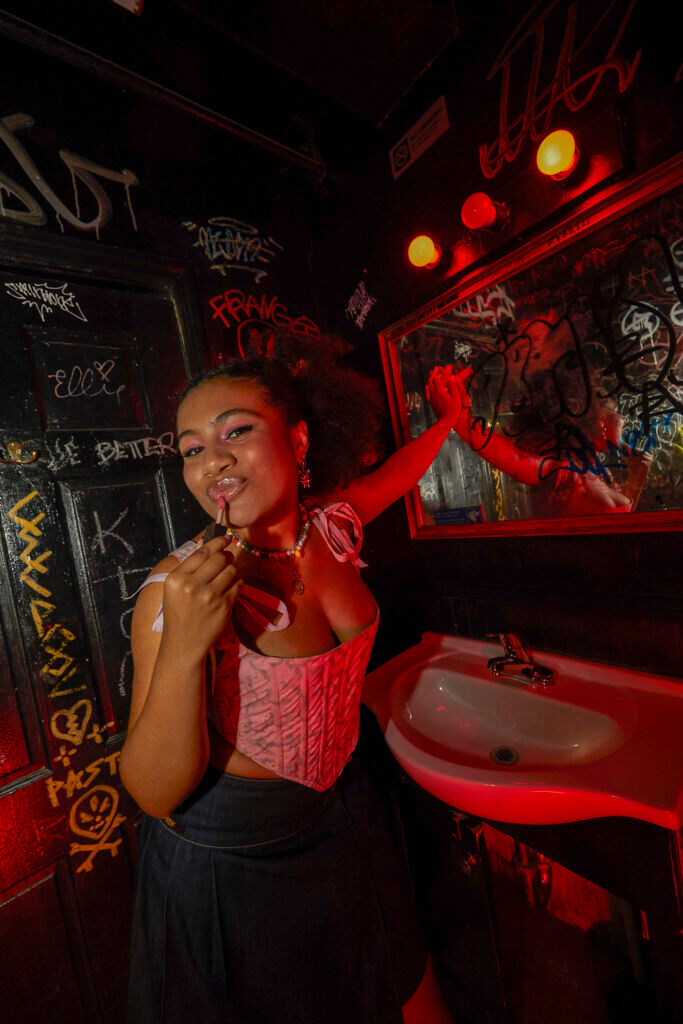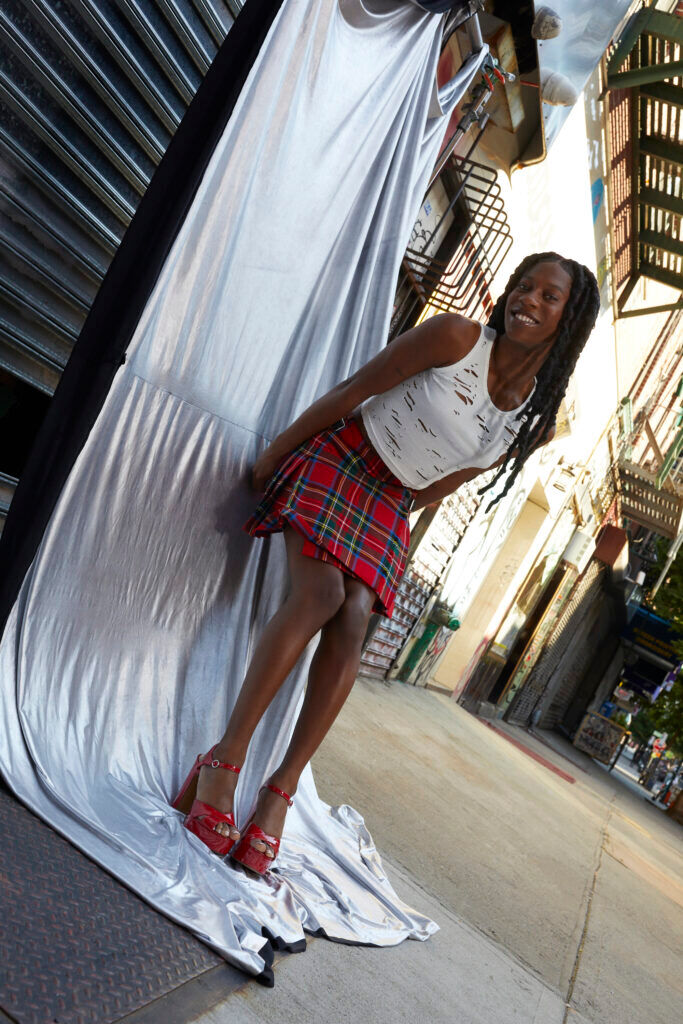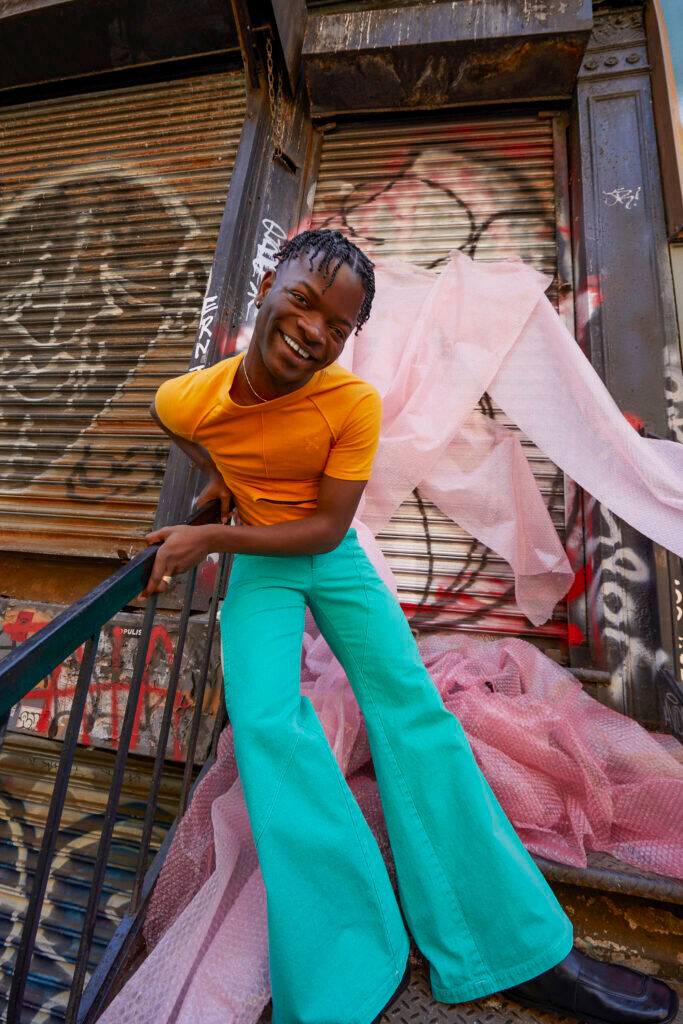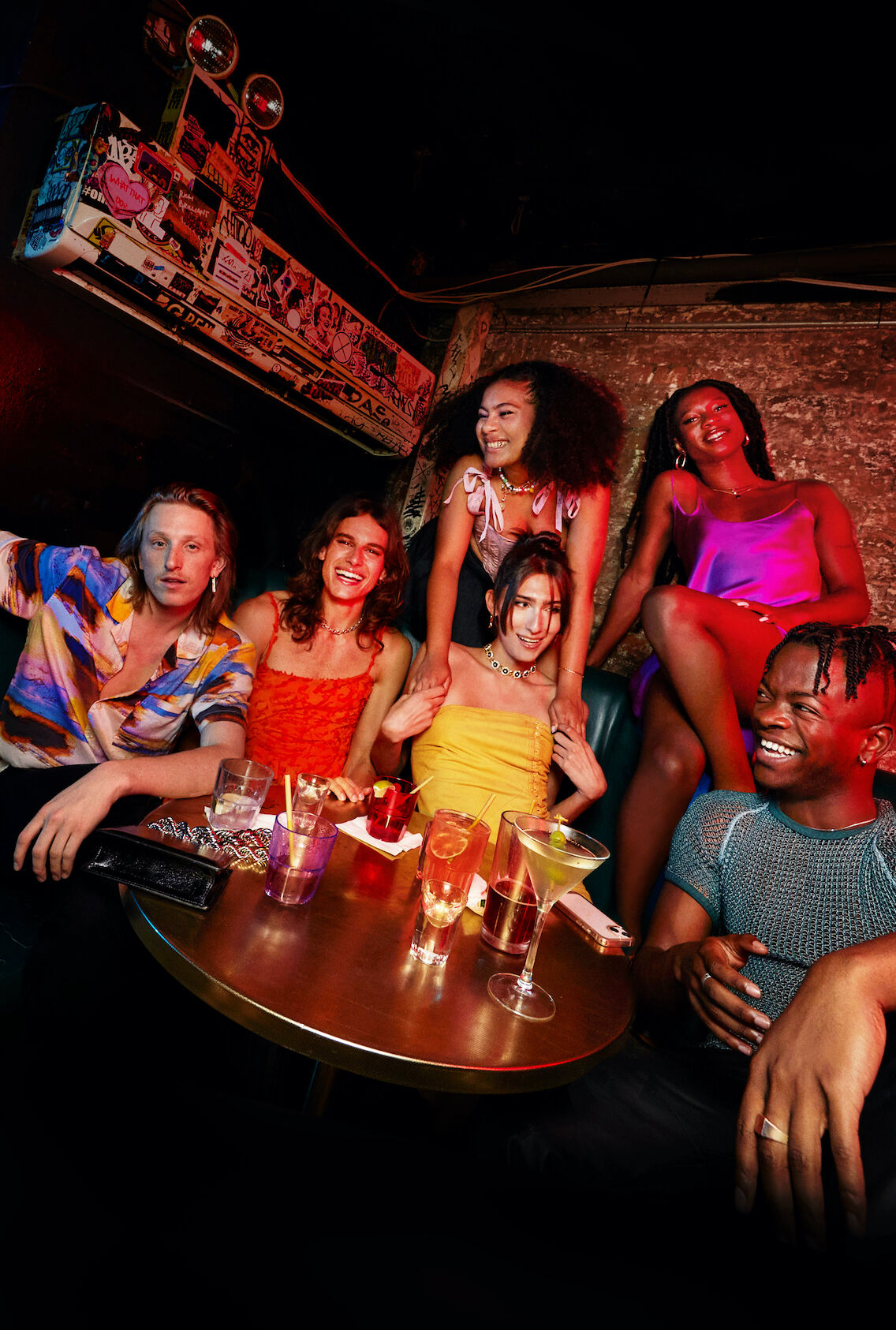In a world where things feel more chaotic and desperate by the minute, there’s nothing more life-affirming than remembering that change is happening, even if it’s the resistance to that change that seems to speak more loudly right now.
Tuning into Freeform’s newest docu-series “The Come Up” can provide a bit of helpful perspective. The show follows six downtown NYC creatives in the first act of what are sure to be illustrious careers in their chosen industries. We get to meet Claude, a trans woman trying to break into the world of acting, Ben, a queer actor who left Texas behind to make in the New York, Sophia, a photographer snapping intimate scenes of New York life, Fernando, a nonbinary model and influencer, Ebon, a nightlife icon, and Taofeek, an emerging designer in the NYC fashion world. Together, the creatives find community and try to recreate the world in their own image: an image of the future that feels hopeful, happy, and full for everyone.
INTO caught up with the stars of “The Come Up” to talk about what success means to them.
INTO: First off, I’m overwhelmed by everyone’s coolness in this show.I love the moment where Claude refuses to eat a New York hot dog. I’m wondering. Wondering if there were any surprising food experiences or cultural experiences you had after coming here as an adult.
Sophia Wilson (photographer, she/her): One time when I was little I took a bite out of one of those, and there was a bone. I started crying and now I’m vegan.
Ben Hard (actor, he/him): I think how nice people are continues to surprise me. I’m from Texas, and I haven’t experienced too much meanness. I don’t know why being mean is a stereotype of New York but I feel like everyone here is living the common New York struggle, and everyone typically looks out for each other. You know, like, it’s been crazy for me for people to come up to me and ask me for directions. I’m like, dude, I barely have been here but yeah, I think people are a lot nicer and a lot more welcoming than people make New Yorkers out to be.

Claude Shwartz: I went to college in Boston, and I came back and I have a lot of old friends, but I have so many new friends that it hasn’t been that difficult, but I mean, it just it kind of varies on who you are just like how you approach socializing. But I mean, it’s the same as everywhere. It’s just charisma and charm and like being able to make friends. But yeah, there are many more opportunities to meet people like me.
I’m wondering if there’s a way in which New York has forced y’all to adapt in a way that’s been interesting.
Taofeek Abijako (fashion designer, he/him): I think it’s more than that. Personally, for me, I’ve seen fashion from this outside lens. I think there’s this fantasy of like, the glamour, the red carpet. Then you realize, it takes a lot more than that to be in it. It requires a lot of crying, a lot of mental breakdowns, anxiety, and also a lot of hugs, a huge range of emotion. A lot of happy tears. That was unexpected for me, personally.
Fernando Casablancas (model, he/they): I think I learned a lot about New York right after I came here. I grew up in Brazil, but my dad worked here and for a long time my parents lived here. Going to New York for me, it was always like, FAO Schwarz, you know, it was the idea of like the toy store and the convenience store that has everything that you ever wanted. So for me, coming to New York was always like this idea of coming to the promised land where you could be anything that you want to be you can do whatever you want, you can find your people, no one can stop you. And so, coming here and realizing that it actually kind of is like that that, means that it can be a little dangerous, you know? Because you can lose yourself in the process. So coming here and having that explosion and losing myself a little bit and then later to start recollecting myself, I learned that I actually want to keep and the things that I learned from like before living in New York. I realized that New York really is like this explosion that you can step into and like either lose yourself or lose yourself to find yourself.
Ebon Gore (model, she/her): Don’t get lost in the sauce

Fernando Casablancas: Yes. Like, I could meet someone and have like the longest conversation and then I won’t see them for like months later. In New York everything is very fast-paced and everyone’s very busy. I don’t think we can just take time to appreciate a lot of things including just relationships and such. So meeting new people for me that was kind of a weird shift. I’m so friendly and like, when I meet someone I would just want to be their friend but it’s not always like that.
A lot of shows about queer youth culture have historically been very tragic and have focused on the hardship, but obviously this show is like very upbeat and like very exciting and very sort of just like positive about people’s lives, which is awesome. I’m wondering how that felt in the actual making of it.
Fernando Casablancas: I’m so thankful for us to be a part of a show that gives us an opportunity to show that there’s not just tragedy. :life is so, so many different aspects, there’s really magical moments, there’s really terrible moments, but those moments are super important because they teach you these lessons that you have to learn. But not every queer story has to be a sad story. Not every like story of struggle has to end in like an abrupt ending or have the most amazing ending, you know, life is just like, as it comes. So for the show to take our lives and make something beautiful out of it is such a privilege. In the end, there’s this underlying feeling of hope because we’re all rising together.
“I realized what made me feel fulfilled and happy is the connection I have with people along the way. So I think to me, that’s what success really means.”
Ebon Gore: For me, I’m a Black trans woman. It brings a lot of awareness to certain situations. And you can like look at all my interviews, dating back to when I was sitting on the couch and they were interviewing me for the show, the one thing I told the producer was like, “I do not want you guys to like give me drama.” “Paris is Burning” and all those docu-series, I grew up on stuff like that. And watching it made me so sad, but it makes me happy to know that like now people can watch this and be like, “wait like, trans girls get to like, do their thing?” Like we can literally have the happiest lives if we choose to. The honest truth is that it was a completely different time. So we are living now, and we’re so fortunate that the world has opened up and allowed us to be who we are. It’s kind of like flipped in that way. Like, who we are now is trendy, and it’s cool to be nonbinary and trans. I think everyone obviously has their own struggles. But I think as long as we keep the hope alive on “The Come Up,” everything is up from there.

What does success mean to all of you like, what is it like money? Is it fame? Is it community? Is it all those things?
Taofeek Abijako: Money helps. (Laughs) One way to see success is just, ultimate joy. Happiness. And that’s one thing I always try to appreciate more. I used to set so many expectations for myself, like, “oh, I need to hit this benchmark. I need to do this. I need to do that.” And then eventually I hit those benchmarks and I didn’t feel as fulfilled as I thought I would have felt. But I realized what made me feel fulfilled and happy is the connection I have with people along the way. So I think to me, that’s what success really means.
Fernando Casablancas: Yes.I think you hit it on the nail. It’s about fulfillment. And that can come in many different ways. If fulfillment for you is finding that dollar sign, then sure. Maybe it’s the validation from someone that I respect and someone that I look up to, that’s one factor of success for me. For me personally, it’s being able to live on my own terms. I’m very fortunate and my parents were able to help me come to New York and live here my first couple of years, but there was a moment where my mom and I didn’t see eye to eye and she like cut me off completely. I had to start from zero, you know, and so getting a job and working at a restaurant and doing 16-hour days and paying my own rent and doing all these things, that was a huge success for me. Like there’s like tiers to it, and so this show really captures success in all these different angles. But for me, it’s also the moment someone younger comes up to you and says “oh my God, I saw you in that commercial” or that campaign. And the joy of being able to touch that one person that feels like maybe they haven’t seen someone onscreen or on TV that speaks their language or speaks for them. We do it for the culture.
Claude Shwartz: Success as an actor would be having so many opportunities to work with amazing people and not have those barriers in front. Like right now, I have another job because it’s not sustainable. Hopefully that will change, and I think that would be my image of success. Being able to just focus on that, and I think you’ll see me working on that this season, and trying to make that what my life is about.
Ben Hard: I think it’s happiness, and happiness is like an umbrella. It’s doing what makes you happy, and then under that, it means having that thing that you love be your financial stability. So like, happiness, like you know, sometimes unfortunately boils down to like, being able to be financially free with your art but also happiness in relationships, with friends and family. The balance and harmony of all those things. ♦
Don't forget to share:
Help make sure LGBTQ+ stories are being told...
We can't rely on mainstream media to tell our stories. That's why we don't lock our articles behind a paywall. Will you support our mission with a contribution today?
Cancel anytime · Proudly LGBTQ+ owned and operated
Read More in Culture
The Latest on INTO
Subscribe to get a twice-weekly dose of queer news, updates, and insights from the INTO team.
in Your Inbox













